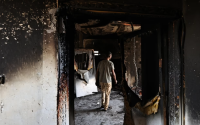20 January 2006The AsianageSeema Mustafa
They were all here. Representatives of the EU-3, powerful players from the US State Department, to make sure that the government of India does not entertain any second thoughts about referring Iran to the UN Security Council and supporting a resolution to that effect at the IAEA Board of Governors meeting on February 2 at Vienna. "We are determined to go that way," said US undersecretary of state for political affairs Nicholas Burns on his mission to, one, ensure India's support on Iran, and then to discuss the plans for the separation of the civilian and military nuclear facilities. But the last was evidently second to Iran, for as a more forthcoming US diplomat told this columnist, "there will be no US Congress and clearance of this nuclear deal unless India supports the EU-3 on Iran."
The bottom line is so well spelt out now, that even the evasive Foreign Office officials here cannot deny that the nuclear deal is intrinsically linked with Iran. And unless New Delhi is able to prove itself a willing ally on any US move on Iran, it is unlikely that civilian nuclear energy will come its way. Prime Minister Manmohan Singh went to the US last July with two items on his agenda. One was the nuclear deal, the other was a seat on the UN Security Council. It emerges now that there was some discussion within the Bush administration on the two issues, and it was decided to concede the first and not the second despite an alternative view that Indian national opinion would be further consolidated in Washington's favour if it pushed to get it a permanent seat on the UNSC. Perhaps the more wily in the US State Department realised that the nuclear carrot could keep the Indian government on its toes trying to reach for it, while a permanent seat would ensure a level of independence for the Asian country that the US administrators were not willing to concede.
There is a concerted effort by the EU-3 and the Americans to cash in on Iranian President Ahmadinejad's not very liberal personality. A campaign to demonise the leader to rally around international opinion against Iran has been very effectively unleashed. He has, in fact, been carefully inducted as a key component in the propaganda war against Iran that now runs something like this: "That chap there is crazy. Can you trust a man who talks about wiping sovereign nations from the face of the world? These guys are maniacs and are definitely working their way towards the bomb. Every right-minded government will support us in stopping this as weapons of mass destruction in the hands of these chaps can only spell chaos and destruction."
Sounds familiar? Yes, and believe me, this is the crux of the argument journalists here have heard from Dr Michael Schaefer, the German point person for EU-3 who was in Delhi for consultations; and from US undersecretary Nicholas Burns who is positive that there can be no reprieve now for Iran. Replace Ahmadinejad with Saddam Hussein, and Iran with the word Iraq, and the rest is a familiar story. The Americans are talking of the military option, the EU-3 is talking of politics and diplomacy, and yet the Europeans know that if Washington decides on military action, there is little it can do to stop it. The only factor stopping the Americans at this point in time is not good sense or respect for the sovereignty of another nation, but the fact that it is overstretched in Iraq and Afghanistan, and will not be able to justify another war to its people at home.
What has Iran done that is so very terrible? It is a signatory to the NPT, it has signed the intrusive Additional Protocol that allows IAEA inspectors unlimited access to its nuclear facilities at literally a moment's notice. It has opened the Natanz facility now after declaring that this is only for peaceful research, and inviting IAEA inspectors in to supervise the entire proceedings. It has expressed its willingness to discuss the issue, and in good faith has opened consultations with Russia. But the Americans and the EU-3 remain convinced that Iran intends to develop nuclear weapons, a deliberate perception that actually expresses their own lack of faith in the IAEA and its ability to ensure that the peaceful nuclear programme is not converted, at any point in time, into the development of nuclear weapons.
On the other hand, this complete disdain for a country's sovereignty is becoming increasingly intolerable. Many who are supportive of the Iranian position today, are not so because they want Iran to make the bomb. But because the very idea of other countries questioning the word of a sovereign President, and building an ugly campaign against a civilised nation that values its independence, cannot be acceptable to those who value their own sovereignty. Bush officials claim that they are acting in their own national interests. One does not dispute that. The problem really begins when this assertion extends into determining the national interests for other countries. After all, as Burns and his colleagues must now be realising, that while they are trying to dress up the nuclear deal with India in a manner that meets with the approval of the US Congress, these efforts are contributing increasingly to apprehension within India's sizeable political establishment that its own national interests are being jeopardised.
The EU-3 and US policy is now twofold. Uncomfortable questions about Iran's professed nuclear transparency at the moment are countered with: but look at Ahmadinejad, that man cannot be trusted. And second, to win Russia and China's support by tailoring the proposed IAEA resolution to refer Iran to the UN Security Council without sanctions. Sanctions can come later. What will it take for this to happen? Dr Michael Schaefer refused to reply, saying, that will have to be seen. Iran has threatened to pull out of all nuclear negotiations if it is sent to the UN Security Council, will this be the trigger for sanctions? No answer.
So what about President Ahmadinejad? The world is making a major mistake in its reading of this President, who incidentally has gained in popular support since the outbreak of the current crisis. His statements are not mad, these are directed towards a constituency within Iran that is the mainstay of national opinion. The English speaking elite in Tehran do not reflect public opinion and the Iranian President, a man from the streets, knows this. Iranians who were sceptical of his election at the first instance, now shake their heads in wonder at their President who along with astute advisors is playing a game of careful brinkmanship. He is nobody's fool, a clever man who has made it clear that while his government is amenable to discussions, it is not open to threats.
The Americans are sounding increasingly threatening, stridently so. A lot of bluster, a great deal of confusion within as Bush's popularity ratings show no signs of going up, a sad realisation that little countries still have the guts to stand up to their military might, and that the "shock and awe" tactics deployed in Iraq have, in fact, strengthened resistance to US hegemony. It is unfortunate that the Indian government does not have the ability to think for itself, and has become so mesmerised with US brokered capitalism, that its foreign policy statements are imbibing the same bluster and arrogance. Iran's Ali Larijani might have acted out of diplomatic line, but in essence, his remark on double standards with India as an example is something that is being said by US Congressmen on a daily basis. Indians themselves are wondering at a nuclear policy that claims the right for some and not for all, with the West and its allies becoming the military policemen giving certificates of "good" "bad" "rogue" to sovereign nations around the world.
The answer lies in nuclear disarmament, in the destruction of this anti-human, ugly and evil weapon that man has invented to destroy himself. But until the US and the Permanent Five come to grips with this, countries like India, Iran, Pakistan and others will continue to seek nuclear power, some within the NPT, some outside. Iran has a hostile neighbour, Israel, more belligerent and unrestrained in its statements than President Ahmadinejad. Prime Minister Manmohan Singh has said that India does not want nuclear states in its neighbourhood. But did he and his pro-bomb supporters ever stop to think that perhaps, just perhaps, the other countries in the region did not want a nuclear India in their midst?






